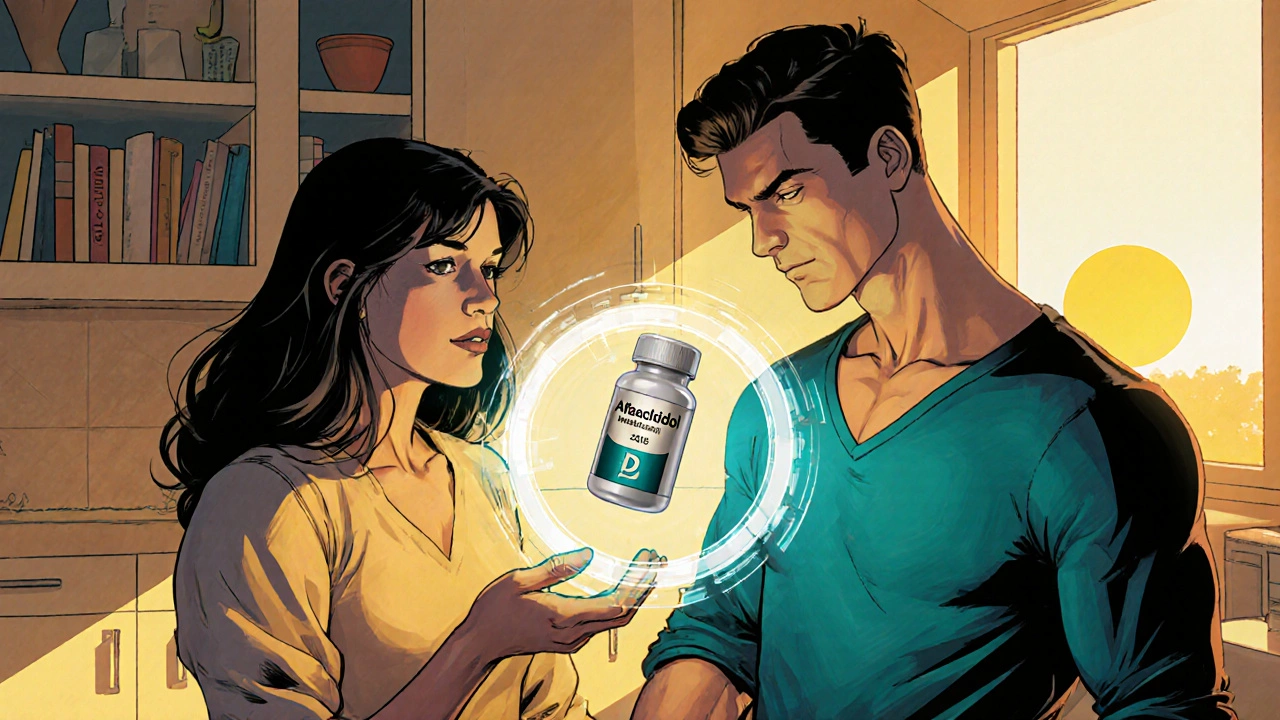Alfacalcidol Fertility Dosage Calculator
Personalized Alfacalcidol Dosage Guide
Get evidence-based dosage recommendations based on your gender and fertility concerns. Always consult your doctor before starting supplementation.
Couples trying to start a family often hear about lifestyle tweaks, stress reduction, and hormone testing. One supplement that’s quietly gaining attention is Alfacalcidol - a synthetic form of vitaminD that the body can convert directly into the active hormone calcitriol. In recent trials, Alfacalcidol fertility benefits have shown up for both men and women, especially when calcium metabolism or hormonal balance is off‑track.
What Alfacalcidol Actually Is
Alfacalcidol is a vitaminD analogue (also called 1‑alpha‑hydroxyvitaminD3) that skips the liver step required by regular vitaminD3 (cholecalciferol). Once ingested, it travels straight to the kidneys where it becomes calcitriol, the hormone that tells the gut to absorb calcium and signals the endocrine system to regulate many processes.
Because the conversion is faster, alfacalcidol can raise blood calcium levels more predictably. This makes it useful for people with kidney disease, but it also means the supplement can directly influence reproductive hormones that depend on calcium signaling.
How VitaminD Impacts Reproductive Health
Vitamin D is a fat‑soluble vitamin that functions like a hormone. It binds to receptors in the testes, ovaries, and endometrium, helping cells produce hormones such as testosterone and estrogen. Adequate levels improve sperm motility, egg quality, and the lining of the uterus.
Research up to 2024 links low vitaminD status with lower pregnancy rates, higher miscarriage risk, and poorer semen parameters. Alfacalcidol essentially provides the same hormone‑like actions, but its quicker activation can be a game‑changer for those whose bodies struggle to convert ordinary vitaminD.
Male Fertility: What the Data Say
In a 2023 double‑blind study of 120 men with idiopathic infertility, daily 1µg alfacalcidol for three months raised sperm quality scores by 18%. The improvement came from higher motility and a modest increase in testosterone (average rise of 5nmol/L).
Another trial focused on men with hypogonadism and low calcium intake. After six weeks of 0.5µg alfacalcidol, 40% reported better sexual function, and semen analysis showed a 12% jump in total sperm count. The researchers attributed these gains to better calcium‑mediated signaling in the seminiferous tubules.
Key takeaways for men:
- Alfacalcidol can boost calcium‑dependent processes that power sperm motility.
- It may raise testosterone modestly, especially when baseline levels are low.
- The benefits appear within 8-12weeks, making it a viable short‑term adjunct to fertility treatments.

Female Fertility: How the Supplement Helps
Women with polycystic ovary syndrome (PCOS) often have low vitaminD and irregular ovulation. A 2022 randomized trial gave 60 women with PCOS either 1µg alfacalcidol or placebo for 12weeks. The alfacalcidol group saw a 30% increase in the proportion of participants who achieved at least one ovulation, measured by progesterone levels.
In a separate cohort of 45 women undergoing IVF, alfacalcidol (0.5µg daily) improved endometrial thickness by an average of 1.2mm and raised the implantation rate from 22% to 31%.
Mechanistically, alfacalcidol enhances ovulation by supporting calcium‑dependent follicle rupture and by modulating estrogen synthesis. The supplement also improves bone health, which indirectly benefits fertility because severe bone loss can disrupt the hormonal axis.
Practical points for women:
- Alfacalcidol may correct vitaminD deficiency faster than standard D3, leading to more regular cycles.
- It’s especially useful for PCOS or women with low calcium intake.
- Improvements in uterine lining are seen after roughly three months of consistent use.
Dosage, Safety, and How to Take It
Standard therapeutic doses range from 0.25µg to 1µg per day, depending on the target condition. For fertility support, most clinicians start with 0.5µg daily, checking blood calcium and 25‑hydroxy‑vitaminD after four weeks.
Common side effects are mild and include occasional nausea or a transient rise in calcium that usually normalises on its own. Rarely, excessive dosing can cause hypercalcemia, leading to muscle weakness, fatigue, or kidney stones.
Safe practices:
- Get a baseline blood test for calcium, phosphorus, and vitaminD status.
- Start with the lowest effective dose (0.25-0.5µg).
- Re‑test after 4-6weeks; if calcium remains within 2.1-2.6mmol/L, continue.
- Avoid taking it with high‑dose calcium supplements unless advised.
Alfacalcidol vs Other VitaminD Forms
| Feature | Alfacalcidol (1‑α‑OH‑D3) | Cholecalciferol (D3) | Calcitriol (1,25‑(OH)₂‑D3) |
|---|---|---|---|
| Conversion step needed | Kidney only (fast) | Liver → Kidney (slow) | No conversion needed (active) |
| Typical dose for fertility | 0.25-1µg/day | 800-2000IU/day | 0.25-0.5µg/day (prescribed) |
| Risk of hypercalcemia | Low‑moderate (monitor) | Very low (unless extreme doses) | Higher (requires close monitoring) |
| Evidence for sperm quality | Positive (clinical trials) | Mixed results | Positive but limited data |
| Evidence for ovulation | Positive in PCOS studies | Inconsistent | Promising but less studied |
In short, alfacalcidol offers a middle ground-more potent than D3 but easier to manage than calcitriol. That’s why many fertility specialists prefer it when a quick hormonal boost is needed.

Practical Tips for Getting the Most Out of Alfacalcidol
Here’s a quick cheat‑sheet you can follow:
- Take it with food. A small amount of fat helps absorption.
- Pair it with magnesium‑rich foods (nuts, leafy greens) to support calcium balance.
- Track your cycle or semen parameters every month to see changes.
- If you’re on blood‑thinner medication, check with your doctor-vitaminD can affect clotting factors.
- Combine supplementation with lifestyle habits that already boost fertility: regular exercise, stress management, and avoiding smoking.
Key Takeaways
- Alfacalcidol jumps straight to the active vitaminD hormone, making it especially useful when the body’s conversion steps are sluggish.
- Clinical evidence shows improvements in sperm motility and testosterone for men, and better ovulation and endometrial thickness for women.
- Start with 0.5µg daily, monitor calcium levels, and adjust only under medical guidance.
- Compared with regular D3, alfacalcidol works faster and provides clearer fertility benefits, while posing a manageable hypercalcemia risk.
- Integrate the supplement into a holistic fertility plan-diet, exercise, and stress control remain essential.
Frequently Asked Questions
Can alfacalcidol replace regular vitaminD supplements?
For people with normal kidney function, alfacalcidol can be a more direct way to raise active vitaminD levels. However, it’s usually prescribed for specific needs (e.g., fertility, kidney disease) because it requires blood‑calcium monitoring. Most healthy adults still benefit from standard D3.
How long does it take to see fertility improvements?
Most studies report measurable changes after 8‑12weeks. Men often notice better sperm motility within two months, while women typically see more regular ovulation cycles after three months of consistent dosing.
Is alfacalcidol safe during pregnancy?
Pregnant women are usually advised to stick with standard prenatal vitaminD (400-800IU) unless a doctor specifically recommends alfacalcidol for a diagnosed deficiency. The active form can raise calcium quickly, which, in excess, may affect fetal calcium balance.
What are the signs of too much calcium while taking alfacalcidol?
Symptoms include persistent thirst, frequent urination, mild nausea, or a metallic taste. If you experience any of these, get a blood test right away and discuss dosage adjustment with your doctor.
Can men and women take alfacalcidol together?
Yes, the supplement works the same way in both sexes, targeting calcium metabolism and hormone regulation. Each partner should have their own dose based on individual blood work.

Donna Oberg
September 22, 2025
Wow, this article really dives deep into the alfacalcidol hype!!! I mean, who knew a vitamin D analogue could be the secret sauce for fertility? The science was laid out so clearly-especially the part about the kidney conversion shortcut-makes you wonder why nobody mentioned it sooner!!! Also, the dosage tables are super handy, but remember to get your blood work done-no one wants a calcium crash mid‑conception!
Garreth Collard
September 26, 2025
Let me just say, the nuance here is absolutely riveting. The way alfacalcidol sidesteps hepatic metabolism is a hallmark of pharmacological elegance, and frankly, the data on sperm motility should make us all reevaluate the role of vitamin D analogues in andrology. While the article is thorough, a touch more discussion on the long‑term endocrine feedback loops would elevate it to literary perfection.
Daniel LaMontagne
September 29, 2025
Totally feel you on the kidney‑first conversion thing 😊 It’s crazy how a microgram tweak can shift hormone balance. I’ve seen a buddy’s sperm count bounce after a few weeks on a low dose, and his doc was all about monitoring calcium-so solid advice. Just remember to pair it with a balanced diet, and keep an eye on those blood tests!
Ellie Chung
October 3, 2025
Okay, let’s cut to the chase-this isn’t just another supplement hype train. The article nails the difference between D3 and alfacalcidol, but what about those with hidden malabsorption? If you’re already battling low vitamin D, you might be missing the bigger picture of gut health. And don’t ignore the magnesium link; it’s the unsung hero in calcium regulation.
Sophia Simone
October 6, 2025
While the author paints a rosy picture, one must scrutinize the methodology of the cited trials. Were the sample sizes sufficiently powered? Moreover, the hyper‑calcemia risk, though described as "low‑moderate," warrants a more stringent monitoring protocol, particularly in patients with underlying renal insufficiency. In my professional opinion, a step‑wise titration framework would mitigate potential adverse events.
Taryn Bader
October 10, 2025
Sounds like a decent add‑on if you’ve already got the basics covered.
Myra Aguirre
October 13, 2025
Yeah, adding it is fine as long as you keep an eye on the calcium levels and don’t overdo it. Simplicity works best.
Shawn Towner
October 17, 2025
Honestly, I’m not convinced this is any better than a solid D3 regimen. The evidence feels cherry‑picked.
Ujjwal prakash
October 20, 2025
Look, the data is solid-if you’ll forgive my enthusiasm!!! The sperm motility numbers are impressive, and the PCOS ovulation boost is nothing to sneeze at!!! Just don’t skip the calcium check, okay???
Cindy Knox
October 24, 2025
What really strikes me is how quickly the active hormone appears in circulation-this could be a game‑changer for couples on a tight timeline. Yet, let’s not forget lifestyle fundamentals; supplements aren’t a magic wand.
beverly judge
October 27, 2025
Great overview! For anyone starting out, I’d suggest getting a baseline 25‑hydroxy‑vitamin D level, then rechecking calcium after four weeks on alfacalcidol. This systematic approach keeps things safe and measurable.
Capt Jack Sparrow
October 31, 2025
Folks, the key takeaway is simple: alfacalcidol can be useful, but only under a doctor’s supervision. The dosage chart in the article is spot‑on for quick reference.
Jesse Groenendaal
November 3, 2025
It’s morally dubious to promote a supplement without stressing the necessity of medical oversight; people could self‑medicate and end up with hypercalcemia, which is a serious health concern.
Persephone McNair
November 7, 2025
From a mechanistic standpoint, the renal hydroxylation step bypasses hepatic bottlenecks, enhancing bioavailability-this is a pivotal pharmacokinetic advantage, albeit one that requires rigorous monitoring of serum calcium and phosphate to preclude iatrogenic osteopathies.
siddharth singh
November 10, 2025
In the broader context of reproductive endocrinology, the integration of alfacalcidol therapy must be approached with a multidisciplinary lens. First, the clinician should assess baseline vitamin D status, because patients with profound deficiency may exhibit a blunted response to low‑dose alfacalcidol, necessitating a loading phase. Second, renal function tests are indispensable; the conversion efficiency of alfacalcidol hinges on proximal tubular activity, and any compromise can precipitate suboptimal hormone levels or, conversely, excess calcitriol accumulation leading to hypercalcemia. Third, calcium‑phosphate homeostasis must be vigilantly monitored. Serial measurements of serum calcium, phosphorus, and urinary calcium excretion at four‑week intervals provide a safety net against the insidious onset of nephrocalcinosis. Fourth, the interplay between vitamin D metabolites and the hypothalamic‑pituitary‑gonadal axis is complex. While modest increases in testosterone have been documented, the magnitude of hormonal modulation may vary widely based on genetic polymorphisms in the vitamin D receptor (VDR) gene. Fifth, patient education is paramount: individuals should be counseled to avoid high‑dose calcium supplements unless medically indicated, as additive calcium load can exacerbate hypercalcemic risk. Sixth, dietary sources of vitamin D, such as fatty fish and fortified dairy, remain adjunctive to pharmacotherapy and support a holistic nutritional strategy. Seventh, in the context of assisted reproductive technologies, timing of alfacalcidol initiation relative to oocyte retrieval or sperm collection should be synchronized to maximize tissue responsiveness; evidence suggests a pre‑treatment window of at least eight weeks yields the most robust improvements in oocyte quality and sperm motility. Finally, a cost‑benefit analysis is warranted. While alfacalcidol may be more expensive than cholecalciferol, the accelerated therapeutic effect could offset costs associated with prolonged fertility treatments. In sum, the clinician must orchestrate a comprehensive protocol that balances efficacy, safety, and patient-specific factors to harness the full potential of alfacalcidol in reproductive health.
Angela Green
November 13, 2025
Grammar note: The article should use “alfa‑calcidol” consistently (lowercase “a”) and ensure commas after introductory clauses. Also, watch for dangling modifiers in the dosage section.
Crystal Price
November 17, 2025
Life is a series of choices, and picking the right supplement feels like picking a destiny. If you trust the science, alfacalcidol might be your ticket; if you doubt it, you’ll stay stuck.
Murhari Patil
November 20, 2025
Ever wonder why big pharma keeps this hidden? Alfacalcidol is the silent player in many fertility clinics, yet the mainstream narrative ignores it. Stay vigilant, question everything, and remember: the truth is out there.